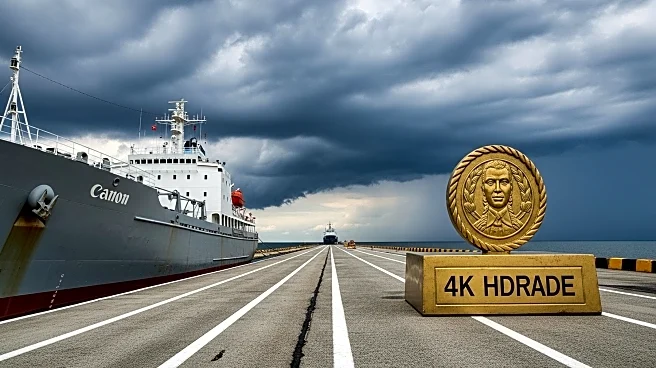What's Happening?
Israeli forces have intercepted a flotilla of 39 boats carrying aid and foreign activists, including Swedish campaigner Greta Thunberg, en route to Gaza. The Global Sumud Flotilla, which set sail in late August, aimed to deliver medicine and food to the Palestinian enclave. The Israeli foreign ministry announced that the activists are being taken to Israeli land for deportation procedures. The interception has sparked international protests, with demonstrations occurring in Italy, Colombia, Greece, Ireland, and Turkey. The flotilla's organizers have condemned the interception as a 'war crime,' while Israel maintains that its naval blockade is legal and necessary to combat Hamas militants.
Why It's Important?
The interception of the flotilla highlights ongoing tensions surrounding Israel's blockade of Gaza, which has been a point of international contention. The blockade is intended to prevent arms smuggling to Hamas, but critics argue it exacerbates humanitarian issues in Gaza. The incident has drawn global attention, with countries like Turkey and Colombia taking diplomatic actions against Israel. The situation underscores the complex geopolitical dynamics in the region, affecting international relations and humanitarian efforts. The involvement of high-profile activists like Greta Thunberg further amplifies the visibility and controversy of the blockade.
What's Next?
The deportation of activists is expected to proceed, with international diplomatic responses likely to continue. Countries involved may seek further diplomatic or legal actions against Israel, while protests and public demonstrations could escalate. The flotilla's organizers may attempt future missions, challenging the blockade and seeking alternative routes for aid delivery. Israel's stance on the blockade remains firm, but international pressure could influence future policy decisions. The situation may also impact broader discussions on Middle East peace efforts and humanitarian aid strategies.
Beyond the Headlines
The interception raises ethical questions about the balance between national security and humanitarian needs. It also highlights the role of international activism in shaping public discourse and policy. The involvement of diverse global actors, including parliamentarians and legal professionals, reflects a growing trend of transnational advocacy for Palestinian rights. The incident may influence future diplomatic strategies and alliances, as countries navigate the complex landscape of Middle East politics.









